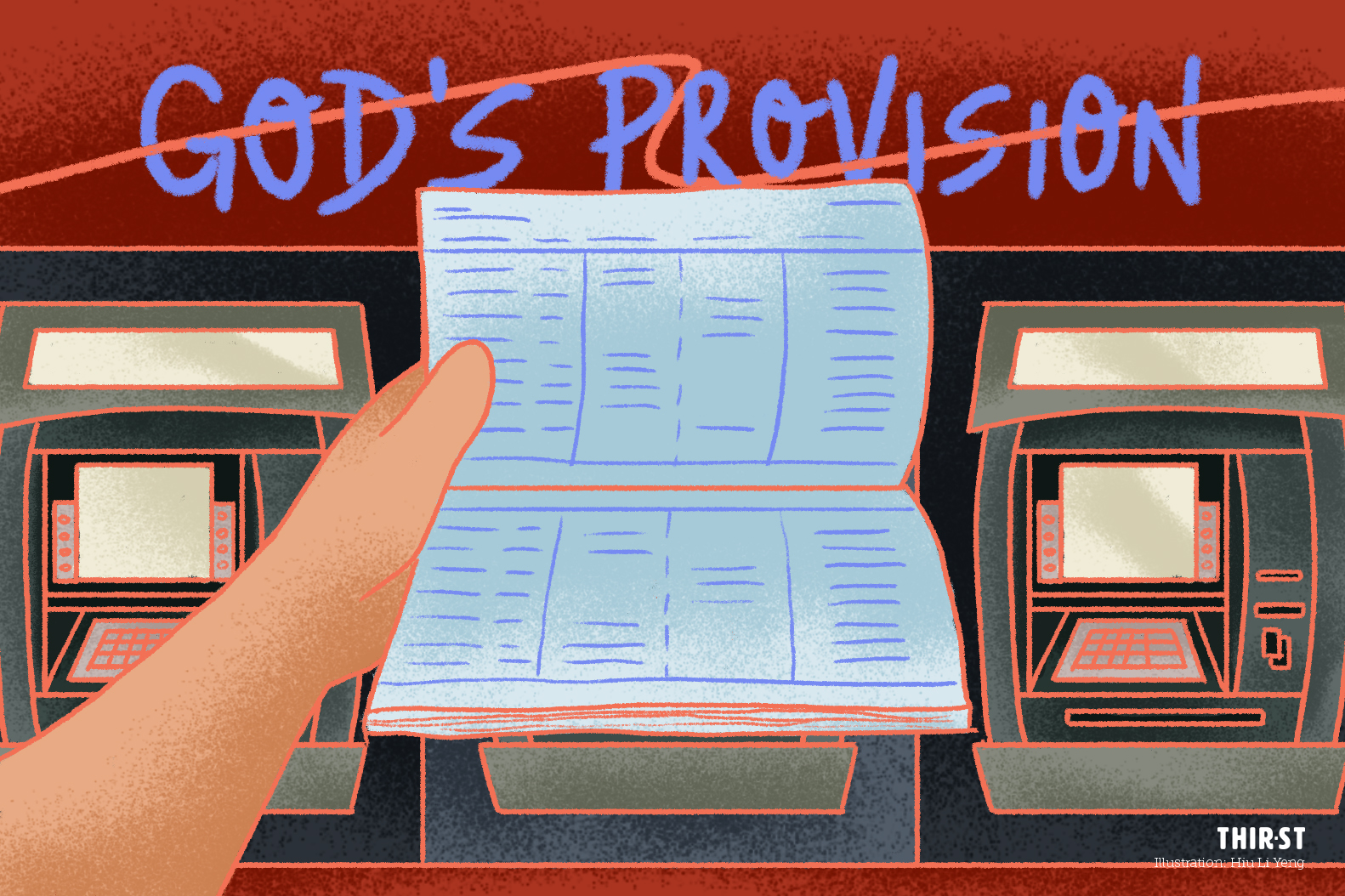Whenever my friends hear that I’m still an intern despite graduating from university more than a year ago, they usually remark: “Can survive meh?” I have yet to draw a full-time salary, so my monthly income has never been more than three digits. And yet my basic monthly expenditure is slightly more than what I earn.
Looking back, it amazes me. The only way I’m surviving is by God’s grace. He has provided job opportunities for me to earn extra income and blessed me with an incredibly supportive family and community who are willing to pitch in when I’m really in a pinch. God always gives me exactly what I need when I need it.
Yet despite experiencing God’s miraculous provision over and over again, I still find myself worrying and reluctant to surrender my issues with money to the Lord.
The Bible clearly says we can’t serve God and money (Matthew 6:24), and I know that. But truly renouncing money as my master is a long and difficult journey.
I’d like to share three lessons from Luke 12:29-31 that have personally helped me.
1. CONTENTMENT
First, I’m learning not to seek what the world seeks.
Most of my friends are already receiving a full-time salary. Yet they still see themselves as “broke” young adults. While they’re not huge earners, they can still afford several indulgences that I can’t with my intern pay. And this makes me wonder, what makes them think they’re broke?
When we let money mould our lifestyles and use it to purchase our identities, it becomes our master.
I then realised that being “broke” has come to mean being unable to afford specific luxuries in life. Or at least a comfortable lifestyle people wish to have, which may include travelling abroad, owning clothes from specific brands and eating brunch every other weekend.
When we let money mould our lifestyles and use it to purchase our identities, it becomes our master. We hoard it in our bank accounts for fear we won’t be able to keep up with the rest of the world. We feel our lack as we compare what we have to what the world defines as wealth, and we end up always feeling “broke”.
But as I struggled with this perceived lack, I came to be content with what I have. I stopped comparing my salary to my friends or stressing about how much the market says I’m worth. Instead I focus on the fact that God has already given us everything. Jesus has purchased us with His blood.
To be content thus means finding security not in what we have – but in knowing whose we are. And this means setting our sights not on worldly things but eternal things.
2. TRUST
I used to feel that I was limited in being able to serve God because of my lack of finances. I didn’t bother signing up for mission trips because I knew I couldn’t afford a plane ticket. Church camps and cell gatherings were also too expensive, so I didn’t bother signing up either.
My hand was always shut tightly around my money. I was fearful of opening it because I thought I’d lose money and then I wouldn’t have enough for myself in the end. I was so focused on what I had in my hand that I couldn’t see the provision God had in store for me.
When I finally learnt to let go and trust God, choosing to sign up for camps and mission trips in faith, He provided and I was never left in lack.
“Is not life more than food, and the body more than clothing?” (Matthew 6:25)
Jesus knew that we were made for more than just surviving; life is more than material necessities. He redefined what I had previously understood to be needs in life. Now I see that life is is about seeking the kingdom of God and His righteousness (Mathew 6:33) first – everything else are just add-ons.
3. STEWARDSHIP
Letting go became easier after I embraced Matthew 6:33. But the next thing that I had to learn was how to steward my resources wisely.
The Parable of the Talents in Matthew 25:14-30 is the perfect illustration of wise and faithful stewardship. In this story, the master had entrusted three of his servants with talents (money). Two of them multiplied their talents by trading it and were praised by the master. The last one buried his talent and was chastised and punished.
The parable teaches us that faithful stewardship is not just about maintaining what God has given us, like the servant who buried his talent in the ground. Rather, stewardship is about doing something with what we have been given by our master. And we see that in the two servants who went out to make the most of their talents.
This isn’t about using our money to make more money for the sake of accumulating more wealth. The two servants used the talents that were given to them by their master and multiplied it for their master. The purpose behind their stewardship was centred on their master. Likewise, we also must remain Christ-centred in our stewardship.
The money our parents have given us or the income we’ve earned by working is ultimately God-given. And these resources have been given to us for the kingdom of God. We are thus wise to freely use our resources for God’s purposes. Though the journey may not be easy, may God guard our hearts so that money cannot take a seat on the throne of our lives.
- What is your current financial situation like?
- When was one time you saw God move in the area of your finances?
- What is one resource in your life you will steward for God?









